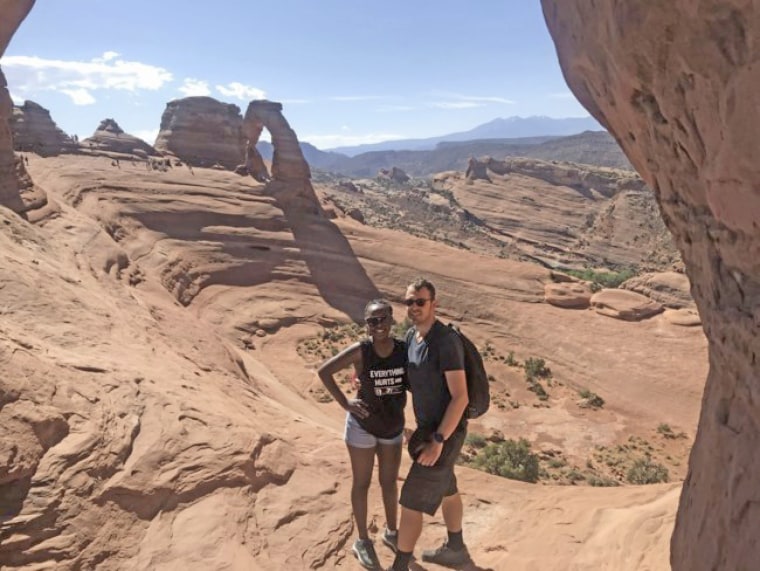The trip to the wind-weathered sandstone of Arches National Park was supposed to be a celebration — a chance for Ludovic Michaud, of Denver, to show his new wife one of his favorite landmarks. Instead, the Utah park became the site of a horrific accident that killed her.
Michaud's wife, Esther Nakajjigo, 25, was a celebrated human rights activist in her home country of Uganda. On June 13, she was “needlessly decapitated” by a metal gate that swung into the couple’s car as they were exiting the Arches parking lot on their way to go get ice cream, according to a wrongful death administrative claim exclusively obtained by NBC News.

The claim, served Oct. 22, is seeking more than $270 million in damages from the National Park Service. It alleges that if park employees had properly installed the gate to not swing into oncoming traffic or placed an $8 padlock on the gate to secure it from moving in the breeze, the world would not have lost “a young woman influencer destined to become our society’s future Princess Diana, Philanthropist Melinda Gates, or Oprah Winfrey.”
Nakajjigo, who went by Essie, was a women’s rights champion in Uganda. At just 17, using her college tuition money, she created a nonprofit community health center.
The same year, Nakajjigo was named Uganda’s ambassador for women and girls. She was particularly passionate about reducing teenage pregnancy and created two reality television shows that empowered women. One, “Saving Innocence,” depicted teenage girls from urban areas helping teen moms in rural communities go back to school.
Nakajjigo received numerous international accolades and awards and had come to the United States to further her education, participating in programs at Drexel University in Philadelphia as a Mandela Washington Fellow and at the Watson Institute in Boulder, Colorado, where she was the recipient of a Luff Peace Fellowship.
But when she met Michaud in June 2019 in Aurora, Colorado, through a dating app, he just saw her as a smart person who loved to laugh.
“I found her really interesting. I didn’t know who she was at first,” Michaud, 26, told NBC News in his first interview since Nakajjigo’s death.
Just as the coronavirus pandemic took hold in the U.S., Michaud, a video streaming technology solution architect who is originally from France, and Nakajjigo decided they wanted to marry. They had a courthouse ceremony in March, with plans to throw a big wedding in Uganda once it was safe to travel again.
That chance never came.
Instead of planning their future together, Michaud is now processing the trauma and grief of Nakajjigo’s gruesome death — and hoping the lawsuit his attorney plans to file will save other families from experiencing what he did.
“Our mission is to make sure this doesn’t happen again,” Michaud said.
According to Deborah Chang, the Los Angeles-based trial attorney representing Michaud, there was nothing he could have done to swerve out of the way of the gate that killed his wife and narrowly missed him.
Yet park employees could have done a lot, the claim alleges, including taking note during inspections of the gate that it posed a danger and putting an inexpensive padlock on it.
A freak accident that has happened elsewhere
This is not the first time a tragedy like this has happened. There have been gate accidents across the country, including another one on federal government property in 1980 in which a camper in California was impaled by a U.S. Forest Service road closure gate.
“There’s a newsletter that went out to all the parks and the National Park Service that warned of this decades ago. They said you have to lock it or it’s going to impale a car, so everyone knows,” Chang said.
The claim she served is legally required before a lawsuit can be filed in court. Chang expects to file the lawsuit in about six months.
The National Park Service did not respond to repeated inquiries from NBC News, nor did Arches National Park Chief Ranger Scott Brown.
The claim describes Nakajjigo’s final moments in graphic detail and says “the end of the lance-like gate pierced the side of their car and penetrated it like a hot knife through butter.”
The large monetary damages being sought on behalf of Michaud and Nakajjigo’s parents are a reflection of the suffering they have gone through plus the loss of Nakajjigo’s future income and fundraising abilities, Chang said.

Michaud was not injured in the accident, but he was covered head-to-toe in his wife’s blood. He has since been diagnosed with post-traumatic stress disorder and has struggled with flashbacks.
“I felt completely meaningless” after losing Nakajjigo, he said. “I couldn’t work properly for a couple of months. It’s still hard to concentrate, but I try to.”
Everything reminds Michaud of Nakajjigo. Even simple tasks — like cooking rice stored in a jar that Nakajjigo bought before her death — feel paralyzing, he said.
“It’s a fear of erasing her, I guess, when you use something that she bought or that she ate or that we did together,” he said.
“It’s a fear of erasing her, I guess, when you use something that she bought or that she ate or that we did together.”
Mail that Nakajjigo has continued to receive after her death has been a stark reminder of the life they should still be enjoying together. One time it was the delivery of her Social Security card; another time, an update on her immigration status. Nakajjigo was not sure where she wanted to work — whether it was in the U.S., back in Uganda or elsewhere — but Michaud was willing to follow her wherever she could continue to make the most impact.
“Her dreams were just about to come true,” Chang said.
Nakajjigo’s remains were flown back to Uganda in August. Michaud hopes he and Nakajjigo’s family can continue her legacy.
“She was always willing to help,” he said. “I was a couple of inches from dying, but I didn’t, and right now I have a mission: It’s to make sure what she’s done continues.”


